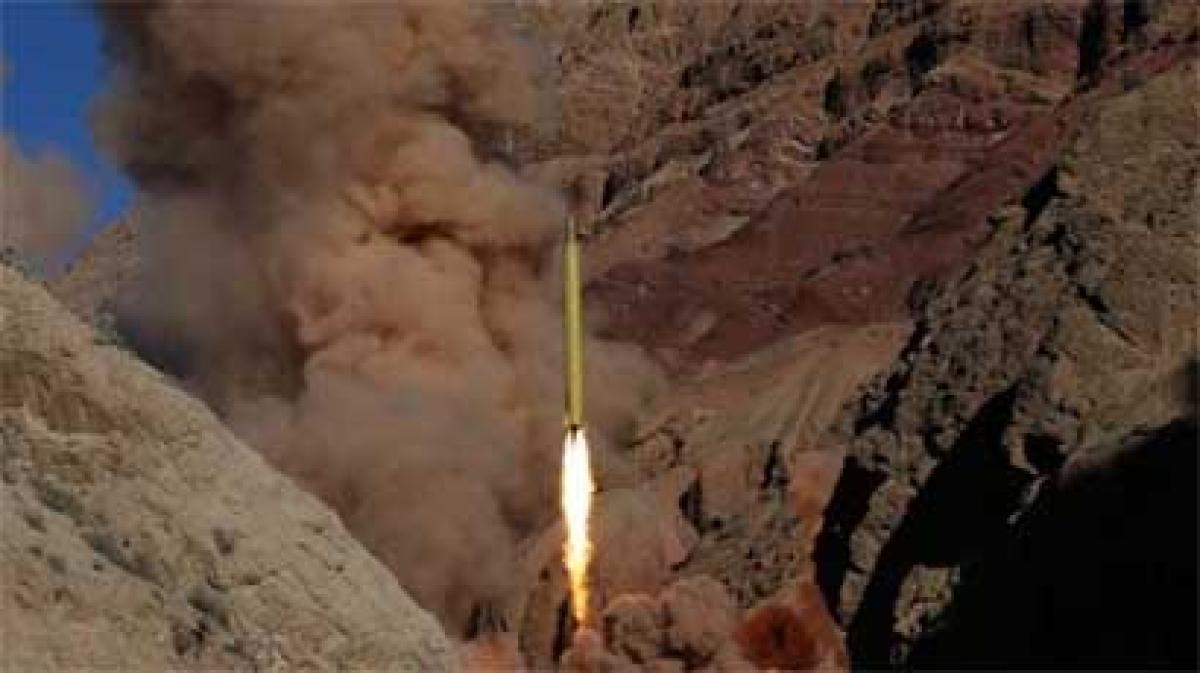Live
- ‘Get Set, Grow Summit 2024’ Focuses on Digital Detox for Families
- Stokes motivates his team to put in extra effort, says England pacer Potts
- From overcoming setbacks to leading India in U19 Women’s Asia Cup, Niki Prasad's amazing journey
- Driving Enterprise Security: Inside Venkata Reddy Thummala’s Leadership Journey
- Constitution debate: PM Modi hails 'Nari Shakti'; makes strong pitch for 'United Bharat’
- Abhijeet Bhardwaj: Revolutionizing Enterprise Analytics with Innovation and Expertise
- Bihar: Inquiry initiated against principal who went to buy veggies during school hours
- Press Sri Lankan Prez for release of Indian fishermen: TN Cong MP to EAM Jaishankar
- TN: DMK postpones executive meet due to heavy rains & Parliament session
- Porous silicon oxide electrodes can fix durability issues in batteries: Researchers
Just In

Iran fired two more long-range ballistic missiles on Wednesday as it continued military tests in defiance of US sanctions and fresh warnings from Washington.
Iran fired two more long-range ballistic missiles on Wednesday as it continued military tests in defiance of US sanctions and fresh warnings from Washington.
The missile tests, described by Iran's powerful Revolutionary Guards as a show of force in the face of US pressure, come just weeks after the implementation of Iran's historic nuclear deal with world powers.
After similar tests on Tuesday, Washington had warned it could raise the issue with the UN Security Council and take further action after US sanctions were imposed in connection with Iran's missile programme in January. US Vice President Joe Biden said Wednesday that the United States would take action against Iran if the missile tests were confirmed.
"All their conventional activity outside the (nuclear) deal, which is still beyond the deal, we will and are attempting to act wherever we can find it," Biden said during a visit to Israel and the Palestinian territories.
He said Washington was also ready to act if Iran breaks the nuclear agreement. The hard-fought deal, which saw international sanctions lifted in exchange for curbs on Iran's nuclear ambitions, did not extend to its missile programme.
Wednesday's tests saw two Qadr-H and Qadr-F precision missiles fired from launcher trucks tucked in the Alborz mountain range in northern Iran, hitting targets about 1,400 kilometres (870 miles) away in the southeastern Makran area, the Guards said.
"Our enemies have come to understand that increasing security pressures and sanctions will not affect the enhancement of our capabilities so they seek to limit us in the missile arena through imposing economic sanctions," said Guards chief Major General Mohammad Ali Jafari.
"Enemies of the Islamic revolution and regional security must fear the roar of the Guards' missiles," he added, quoted by the Guards' official website.
The Guards' deputy head General Hossein Salami said the missile tests were to demonstrate Iran's "defence and deterrent power".
"We have massive stockpiles of ballistic missiles waiting for orders and ready to hit targets at any moment from various points across the country," Salami said.
Ballistic missile tests have been seen as a way for Iran's military to demonstrate that the nuclear deal will have no impact on its plans, which it says are for domestic defence only.
US will counter threats
Previous UN resolutions have aimed at stopping Tehran from developing missiles capable of carrying a nuclear warhead, although Tehran has always denied seeking the capability.
The US sanctions imposed in January saw five Iranians and a network of companies based in the United Arab Emirates and China added to an American blacklist.
US Secretary of State John Kerry called his Iranian opposite number Mohammad Javad Zarif Wednesday to protest the latest tests. The pair had built up a close working relationship during negotiations for last year's nuclear accord.
US State Department spokesman John Kirby said Tuesday that if the latest missile tests were confirmed "then we'll have every intention of raising the matter to the UN Security Council".
Kirby warned that the United States could take unilateral action "to counter threats from Iran's missile programme".
This week's series of tests have included short-, medium- and long-range precision guided missiles with ranges of between 300 and 2,000 kilometres, state media reported.
"The reason we have designed these missiles with such a range 2,000 kilometres is to be able to hit our remote enemies, the Zionist regime," said General Amir Ali Hajizadeh, who heads the Revolutionary Guards' aerospace wing, referring to Israel.
"But there is no need to fire missiles to destroy the Zionist regime as it will gradually collapse. Our main enemy is the US," he said.
News agencies Fars and Tasnim, both close to the Guards, said the phrase "Israel must be wiped off the face of Earth" was inscribed in Hebrew on the missiles, recalling a quote by the late revolutionary leader Ayatollah Ruhollah Khomeini. However, no writing was visible on the missiles shown in video footage or pictures published by local media.
Israel's foreign ministry "strongly condemned" the tests in a statement released Wednesday.
President Hassan Rouhani, a cleric close to moderates, pursued the nuclear deal in a bid to end Iran's international isolation. Less than two weeks ago, his moderate and reformist allies scored key gains against conservatives and hardliners in elections.
But the Revolutionary Guards report to Iran's supreme leader Ayatollah Ali Khamenei, not Rouhani, and their influence dwarfs that of the army and other armed forces.

© 2024 Hyderabad Media House Limited/The Hans India. All rights reserved. Powered by hocalwire.com







